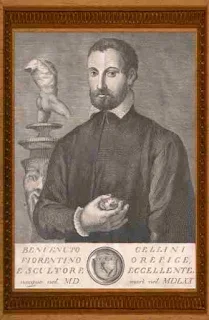Memoirs of Benvenuto Cellini, a Florentine artist
 |
| Memoirs of Benvenuto Cellini |
As to the incredibility which attaches to some of his narrations, his own confined education, his susceptible nerves, his superlative credulity and superstition, and wild imagination, may, in general, be sufficient apologies for him, and save him from the charge of intentional misrepresentation.
And as the other parts of his work are universally allowed to abound in the knowledge of life, and of the passions and conduct of mankind, so these incredible stories, gravely asserted by a disinterested man of unquestionable talents, may contribute to convincing us of the strict caution with which we should receive all marvellous accounts, however well attested. In presenting a new edition of this curious autobiography to the public, it may be proper to state what additional claims it possesses, in addition to its intrinsic attractions.
In the year 1830, Signer Giuseppe Molini, of Florence, brought out a new and most valuable edition of Cellini's Life, printed word for word from the original MS., as dictated by the author, forming one of the volumes of his " Biblioteca Italiana Portatile."
Aware probably of my preceding English edition, printed in 1822, collated with the text, and enriched with notes from the Milan edition of G. P. Carpani, Signor Molini had the kindness to present me with a copy of his new Cellini. From this source I have derived several interesting additions, of which I have availed myself in the present popular form of publication.
The learned Italian editor describes " this precious document" as having been accidentally discovered by Signor Poirot, in 1810, at the shop of "one of" our "booksellers" — we are led to infer — at Florence. At the death of the " Segretario" (Poirot) in 1825, it passed, with all his " MSS.," into the Laurentian library, in compliance with the tenor of his will. "With permission of the grand duke, the editor of the "Biblioteca" took a verbatim copy, which he collated with the Milan edition of 1821, from the Bettoni press.
The fortunate and proud possessor of the original " MS.,* whose filial piety in the above record testifies at once to the wide fame of Cellini, and the jealous Dilettanti spirit of his father, made a gift, it appears, of his family treasure to Redi, who extracted from it the words which were afterwards inserted in the Tuscan Vocabulary.
How the long-treasured heir-loom subsequently found its way from the learned Redi's library, through a great variety of hands, till it arrived at the shop of Signor Cecchino — a man justly esteemed by the collectors of curious books — Signor Molini is at a loss, equally with the rest of the world, to account. That this is the original document farther appears from the fact of Cellini's having never made a copy, so that these were dispersed throughout various libraries, obtained doubtless from some clandestine copy, and, in Molini's opinion, all imperfect; each copyist having been found to add to the errors of his predecessors.
Without reference to these, therefore, Signor Molini adhered closely to the original text; a rule that has been as strictly observed in this new English edition. Numerous omissions in the former translation have now been supplied, and errors and inadvertencies rectified, which often injured the effect of the narrative, and even rendered obscure the meaning of the author.
Benvenuto Cellini was an Italian goldsmith, sculptor, and author. His best-known extant works include the Cellini Salt Cellar, the sculpture of Perseus with the Head of Medusa, and his autobiography, which has been described as "one of the most important documents of the 16th century
Download 23.8 MB

